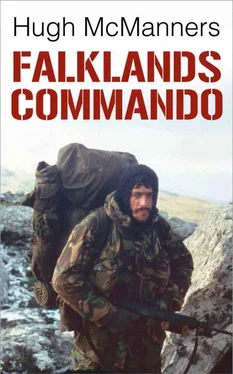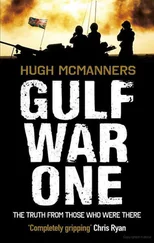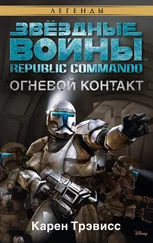Hugh McManners - Falklands Commando
Здесь есть возможность читать онлайн «Hugh McManners - Falklands Commando» весь текст электронной книги совершенно бесплатно (целиком полную версию без сокращений). В некоторых случаях можно слушать аудио, скачать через торрент в формате fb2 и присутствует краткое содержание. Город: London, Год выпуска: 2014, ISBN: 2014, Издательство: Nightstrike Publishing, Жанр: nonf_military, Биографии и Мемуары, на английском языке. Описание произведения, (предисловие) а так же отзывы посетителей доступны на портале библиотеки ЛибКат.
- Название:Falklands Commando
- Автор:
- Издательство:Nightstrike Publishing
- Жанр:
- Год:2014
- Город:London
- ISBN:978-0-992-81540-0
- Рейтинг книги:4 / 5. Голосов: 1
-
Избранное:Добавить в избранное
- Отзывы:
-
Ваша оценка:
- 80
- 1
- 2
- 3
- 4
- 5
Falklands Commando: краткое содержание, описание и аннотация
Предлагаем к чтению аннотацию, описание, краткое содержание или предисловие (зависит от того, что написал сам автор книги «Falklands Commando»). Если вы не нашли необходимую информацию о книге — напишите в комментариях, мы постараемся отыскать её.
Falklands Commando — читать онлайн бесплатно полную книгу (весь текст) целиком
Ниже представлен текст книги, разбитый по страницам. Система сохранения места последней прочитанной страницы, позволяет с удобством читать онлайн бесплатно книгу «Falklands Commando», без необходимости каждый раз заново искать на чём Вы остановились. Поставьте закладку, и сможете в любой момент перейти на страницу, на которой закончили чтение.
Интервал:
Закладка:
However good the qualities they promote, public schools cast a divisive shadow over life in the officer corps of the modern British Army. Public-school manners and self-confidence are easily recognisable standards of behaviour that the army believes are synonymous with being an officer. Thus officers who did not go to public school (the majority) can feel at a disadvantage, socially inferior, even to the extent of not being ‘proper’ officers.
Inside the British Army, the effect of institutionalised snobbery is insidious and widespread, although few would admit that it even exists. To a varying extent it inhibits individuals from doing and saying what they actually think. Peacetime army life can be highly stressful for those who continually have to keep up socially. Because such people can never entirely relax and be themselves, their lives become unnecessarily uncomfortable – regimented in every sense.
All armies have elite units that attract the best officers and soldiers, and are accepted as having the highest military standards. The British Army, however, is unique in that it has two sorts of elite unit: military elites like the SAS and the Parachute Regiment; and socially elite units like the Life Guards, Foot Guards and Cavalry. This concept of socially elite units is essentially European, the product of military history and tradition – today’s social elites being yesterday’s military elites.
The idea of a privileged officer caste monopolising units like the Household Cavalry would be intolerable to the Israeli Defence Force, although Israel’s best soldiers do come from the best-educated and most prosperous strata of Israeli society. The IDF exists only to ensure the survival of the State of Israel and is therefore geared solely to war. The elitism of IDF units is related to public opinion, based upon well-informed public knowledge of units’ performance in combat operations. The units deemed most significant in the defence of Israel have the best reputations.
While there is no doubt of the quality of the British Army’s military elite units, in recent years its socially elite units have been nothing like so consistent. It could be argued that the Household Cavalry and Foot Guards demonstrate high standards by doing two jobs – public duties and normal military training. However, public duties, such as mounting guard at St James’s Palace and Buckingham Palace, turning out to receive foreign dignitaries and rehearsing parades – all in London – are a daily grind. They simply do not allow time for more than rudimentary military training, achieving standards about equal to those of a Territorial Army unit – according to an Irish Guards company commander.
The difference in military capability between socially elite regiments and military elite units in one respect may not be as unequal as it seems. Winning modern battles on the playing fields of Eton might sound ridiculous, but it is undeniably true that the British upper classes have always produced good soldiers, from top generals to unconventional fighters like David Stirling (who started the SAS) and Lord Lovat. Nobody can deny that the socially elite Scots Guards were successful in achieving an apparently impossible five-week transformation from public duties in London to being combat-effective in the Falklands. It must also be said that their success was due to the realistic leadership of their professional and perceptive Commanding Officer, and not to their Guards antecedents.
Socially elite regiments believe that somehow their social status will translate itself into an equal level of military expertise. This attitude is a form of self-delusion drawn from a deep well of collective overconfidence, which under an unrealistic Commanding Officer can become dangerous. (Believing your own PR has also brought down many high-flying business organisations and individuals.) Socially elite units, believing themselves to be inherently good, tend to attempt to ‘cuff’ or ‘wing it’ without proper preparation, with the result that unrealistically difficult exercises are imposed on undertrained troops who make a mess of them (which their CO then covers up). The individual soldiers in these regiments are also expected to be elite, to avoid making mistakes regardless of their standard of training. According to an army psychiatrist, the pressure this can place on some men leads to psychotic reactions.
Military elite units approach training with a very different attitude, incorporating an intimate knowledge of their soldiers’ limitations. The ‘invincible’ SAS rehearse everything they do ad nauseam, as would a professional theatre company. The standard and difficulty of training is steadily built up until the required level is reached. A British Army psychiatrist:
“The special units have got the psychology of it right: keeping people within their capabilities, then training them well beyond the standard of that required in war. They have tight-knit groups, which stay together, and train for jobs exhaustively, in manageable parts. Some people can do certain things well, and are not so good at other things. Nobody can do everything well. The army is not good at being honest about this.
These social elites need to be brought down to earth, from the fantasy of fancy ceremonial. Regimental tradition is all right, but all the donkeywork has to be done by the soldiers – who enjoy the military side of their jobs, but usually not the ceremonial. What are these socially elite units actually better at? They have this irrational feeling of superiority, but what is it actually based on?”
In any army it’s healthy for units to believe they are the best. Social elitism in the British Army however, is far deeper than that, being based solely upon the class of the officers. The socially elite units in the British Army identify completely with their own perceived social status. Their officers socialise with each other rather than with officers of lesser regiments, and their soldiers feel themselves to be the best because their officers are the best – from the top public schools and top-drawer families. The subject of military efficiency does not arise where pedigree and quality are beyond question.
The list of socially elite regiments is headed by the Household Cavalry, then the Foot Guards and some of the Cavalry regiments. The now-amalgamated Royal Green Jackets (infantry) slid into this batting order near the top. Some regiments are considered less elite than others; the cavalry talked disparagingly of the ‘vulgar fractions’ (regiments like the former 15/19 King’s Hussars or the 9/12th Lancers), and the infantry of ‘fish and chip’ regiments.
The importance of an established pecking order among British regiments has long been recognised. The strict precedence of British Army regiments is actually laid down in Queen’s Regulations, the more senior regiments positioned ‘to the right of the line’. Today the official precedence of Queen’s Regulations is hopelessly out of date in social terms. When ‘right of the line’ is quoted, the Royal Artillery on parade with its guns takes the premier position, which everyone would agree does not demonstrate its current social superiority. Despite the strict ordering of QRs, psychological elitism remains competitive and based upon the perceptions of the regiments themselves.
Initiation ceremonies are very basic human events, carried out by all societies. Unofficial military initiations are additional to that provided officially by basic training, and can be seen as a sign that the members of the regimental ‘club’ do not respect the selectivity of basic training. Their aim is to degrade the initiate, cutting him down to size before permitting him into ‘club’ membership. There have been tragedies, and countless other narrow and very frightening escapes. In one case, a boy was tied to a chair then thrown from a second floor window. He was so badly affected by this, he started drinking and was eventually medically boarded and left the army, because he constantly associated green uniforms with this terrifying experience.
Читать дальшеИнтервал:
Закладка:
Похожие книги на «Falklands Commando»
Представляем Вашему вниманию похожие книги на «Falklands Commando» списком для выбора. Мы отобрали схожую по названию и смыслу литературу в надежде предоставить читателям больше вариантов отыскать новые, интересные, ещё непрочитанные произведения.
Обсуждение, отзывы о книге «Falklands Commando» и просто собственные мнения читателей. Оставьте ваши комментарии, напишите, что Вы думаете о произведении, его смысле или главных героях. Укажите что конкретно понравилось, а что нет, и почему Вы так считаете.












